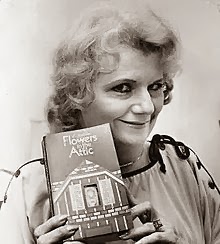Mom: I have to go soon. We're going to watch Flowers in the Attic on Lifetime.
Me: Flowers in the Attic? Are you serious? Do you know anything about those books?
Mom: Well, I know your sister used to read them when she was in high school. (Which is true. My oldest sister went through a big horror stage at one time.)
Me: So, you know V.C. Andrews wrote the series. Do you have any idea what the story's about?
Mom: Abuse.
Me: Among other things.
Mom: What's that supposed to mean?
Me: Let's just say there's a relationship that develops between the older siblings.
Mom: Oh. Hey, it's on I gotta go.
 |
| The disturbing Dollanganger clan hanging out in the attic. |
Who would've thought that all these years later a story like Flowers in the Attic would cut short my telephone conversation with my mother. To say I was stunned is putting it mildly. My mother never showed a shred of interest in books like that when I was growing up.
But, this conversation got the wheels in my head turning. Like many of you out there, I've read a V.C. Andrews book or two. Okay, maybe only two now that I think about it. I was never much of a fan of hers. By the time I was in high school, her work was no longer popular among the kids in my class. For those of you unacquainted with her novels, Andrews' work had a flair for Gothic horror and strange family saga, usually mixing a forbidden, or should I say taboo, love into the mix. She was, in my opinion at least, one of the few writers back in the late seventies and eighties writing genre fiction for what is now considered the YA market. Her stories had those creepy, forbidden elements that are now found everywhere in YA literature.
 |
| V.C. Andrews with her first novel |
At first, I was thoroughly confused, because I was almost sure she had died quite a while back. On a whim, I pulled a book off the shelf and flipped to the copyright page. This is what it said:
"Following the death of Virginia Andrews, the Andrews family worked with a carefully selected writer to organize and complete Virginia Andrews' stories and to create additional novels, of which this is one, inspired by her storytelling genius."I was a bit gobsmacked after reading this. My first thought was, "What a ripoff!" Books are still being published under her name, but she's not even the author? My second thought was, "Why would any author want to publish under some other author's name?" The answer to that is probably a financial one, but that's just my opinion. I ended up checking the book out, because I wanted to see the style of this "other author" and how it supposedly translates to Andrews' style.
The book I chose, Delia's Crossing, is from a Mexican girl's point of view. We follow her from Mexico, after a horrific accident has claimed the lives of her parents, to California where she winds up being the household maid for her screechy, evil aunt. What I found is that although the ghost-writer, (how apropos for an Andrews novel) Andrew Neiderman, uses the same themes as Andrews did (i.e. rape, evil family members, questionable cousins, deep dark secrets, etc.) the story feels repetitive and really brings nothing new to the table. Delia's Crossing is a fast, easy read, but about halfway through, I was tired of the shrill aunt, the shrill cousin, and the almost paint-by-numbers approach to the plot. Maybe I need to be fifteen again to enjoy the salacious content.
For whatever reason, after I put the book aside, I couldn't shake the V.C. Andrews cult. That's kind of what it is really. Why do we cling the the way this author wrote to the point that we'd read a book that lures the reader in under false pretexts (i.e. Andrews' name)? Whatever it is, her estate found a lucrative foothold. Why would her estate continue to publish books that aren't even by her, but bearing her name, all these years after her death? Because just like the IRS figured out, her name alone is a valuable commercial asset. She is a business, plain and simple, plying the audience with inauthentic versions of the actual product, just like Walmart or McDonald's.
And this is what I find so disappointing about what's happened with V.C. Andrews' writing. As a writer, my story ideas come from my head alone. I don't care how many notes or half-written books I leave behind when I die, I have no intention of having posthumous stuff published unless it was already on its way out the door to the publishers. I don't want my work to be stripped to its bare bones, passed onto another writer to write as he/she wishes. I want my craft to be just that -- my craft. I have no idea what V.C. Andrews' wishes were concerning her work, but if this was not what she had in mind, then I find it very disappointing. Margaret Mitchell expressed how there would never be a sequel to Gone With the Wind, and look what happened there. J.D. Salinger, as odd as he was, viewed his work in the same light. His will states that none of his work is to be published until fifty years after his death.
So, here are my questions to you: Are you a fan (or have you been in the past) of V.C. Andrews' books? Have you read the ones written by her ghost-writer? Do they stand up to Andrews' original works? Do you know of any authors whose work has received the same posthumous treatment?




